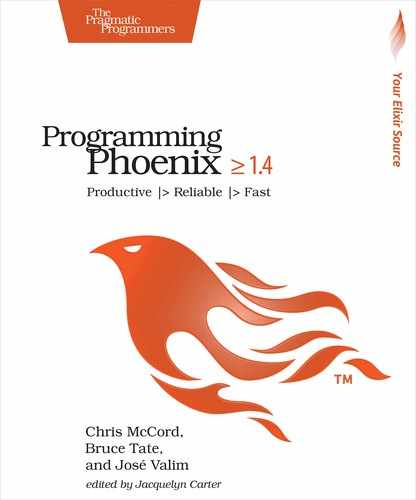Building a Controller
You’ve already built a simple controller, so you know the drill. At this point, we could create all of the routes needed by a user automatically with the resources macro, but we are going to play the teacher and say “Show your work!” If you understand how a single route works, it’ll be much easier to explore the powerful shortcuts later. Specifically, we need two routes. UserController.index will show a list of users, and UserController.show will show a single user. As always, create the routes in router.ex:
| | scope "/", RumblWeb do |
| | pipe_through :browser |
| | |
| | get "/users", UserController, :index |
| | get "/users/:id", UserController, :show |
| | get "/", PageController, :index |
| | end |
Notice that we have our two new routes and the default route for /. Our two new routes use the new UserController, which doesn’t yet exist, with the :show and :index actions. The names and URLs we’ve chosen for these actions aren’t random. The :show, :index, :new, :create, :edit, :update, and :delete actions are all frequently used in Phoenix. For now, follow along strictly, and you’ll learn the shortcuts later.
Let’s take a closer look at the :index route:
| | get "/users", UserController, :index |
You’ve seen the get macro before. The route matches HTTP GET requests to a URL that looks like /users and sends them to the UserController, calling the index action. That route stores :index—the action we intend to invoke—in the conn and then calls the right pipeline.
Now, restart your server and point your browser to http://localhost:4000/users. You get some debugging information, but you don’t have to go beyond the title to find this message:
| | UndefinedFunctionError at GET /users |
| | |
| | function RumblWeb.UserController.init/1 is undefined |
| | (module RumblWeb.UserController is not available) |
That makes sense; we haven’t written the controller yet.
Let’s create a controller in lib/rumbl_web/controllers/user_controller.ex. Initially, we’ll include one function called index to find the users from our Accounts context:
| | defmodule RumblWeb.UserController do |
| | use RumblWeb, :controller |
| | |
| | alias Rumbl.Accounts |
| | |
| | def index(conn, _params) do |
| | users = Accounts.list_users() |
| | render(conn, "index.html", users: users) |
| | end |
| | end |
Let’s take that code apart. There’s a little bit of ceremony at the top of the file that defines our module and announces that we’re going to use the :controller API. Right now, the only action is index.
If you access the users page again, you can see that we’re getting an error message, but we’ve traded up:
| | UndefinedFunctionError at GET /users |
| | |
| | undefined function: RumblWeb.UserView.render/2 |
| | (module RumblWeb.UserView is not available) |
Progress! We have a controller, but we still need to code a view.
